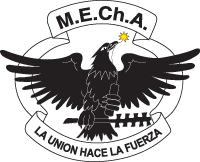
M.E.Ch.A. is a US-based organization that seeks to promote Chicano unity and empowerment through political action.

The NAACP Legal Defense and Educational Fund, Inc. is an American civil rights organization and law firm based in New York City.
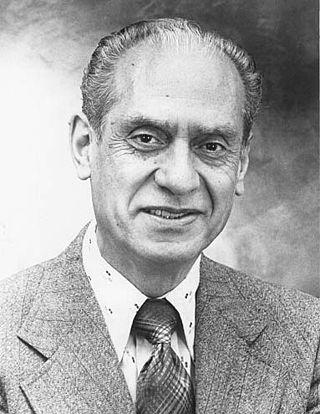
Edward Ross Roybal was a Mexican-American politician. A member of the Democratic Party, he was the first Latino American to be elected to the Los Angeles City Council, serving from 1949 to 1962. He later served 15 terms in the U.S. House of Representatives from 1963 to 1993, representing portions of Downtown and East Los Angeles.
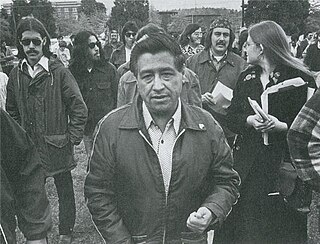
The Chicano Movement, also referred to as El Movimiento, was a social and political movement in the United States that worked to embrace a Chicano/a identity and worldview that combated structural racism, encouraged cultural revitalization, and achieved community empowerment by rejecting assimilation. Chicanos also expressed solidarity and defined their culture through the development of Chicano art during El Movimiento, and stood firm in preserving their religion.
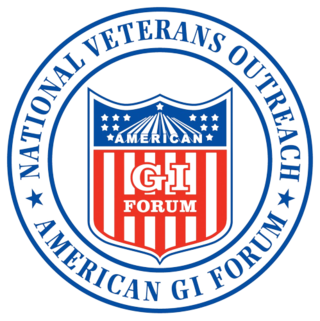
The American GI Forum (AGIF) is a congressionally chartered Hispanic veterans and civil rights organization founded in 1948. Its motto is "Education is Our Freedom and Freedom should be Everybody's Business". AGIF operates chapters throughout the United States, with a focus on veterans' issues, education, and civil rights. Its two largest national programs are the San Antonio-based Veterans Outreach Program, and the Dallas-based Service, Employment, Redevelopment-Jobs for Progress, Inc. (SER). The current National Commander is David Rodriguez.
Chicano studies, also known as Chicano/a studies, Chican@ studies, or Xicano studies originates from the Chicano Movement of the late 1960s and 1970s, and is the study of the Chicano and Latino experience. Chicano studies draws upon a variety of fields, including history, sociology, the arts, and Chicano literature. The area of studies additionally emphasizes the importance of Chicano educational materials taught by Chicano educators for Chicano students.

Norma V. Cantú is an American civil rights lawyer and educator. From 2021 to 2023, she served as chair of the United States Commission on Civil Rights, the first Latina to hold the position.

John David Trasviña is a human rights attorney. He is the former dean of the University of San Francisco School of Law. Previous to that, he was assistant secretary of the Office of Fair Housing and Equal Opportunity in the U.S. Department of Housing and Urban Development, president and general counsel of the Mexican American Legal Defense and Educational Fund (MALDEF), and special counsel for Immigration Related Unfair Employment Practices at the U.S. Department of Justice. He was named principal legal advisor at U.S. Immigration and Customs Enforcement in January 2021.
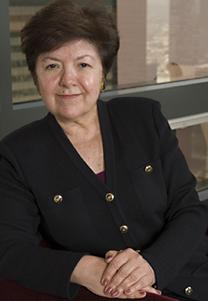
Vilma Socorro Martínez is an American lawyer, civil rights activist and diplomat who formerly served as the U.S. Ambassador to Argentina from 2009 to 2013 under President Barack Obama.

Mario Guerra Obledo was an American civil rights leader. He was called the "Godfather of the Latino Movement" in the United States, credited with establishing numerous civic institutions and bringing Latino interests into the center of the U.S. political arena. He also served as California's Secretary of Health and Welfare from 1975 to 1982.
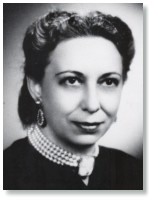
Alicia Dickerson Montemayor was an American civil rights activist from Laredo, Texas, the first woman elected to a national office not specifically designated for a woman, having served as vice president general of the interest group, the League of United Latin American Citizens. She was the first woman to serve as associate editor of the LULAC newspaper and the first to write a charter to fund a LULAC youth group. Montemayor urged the inclusion of girls and women into Latin American activism and also promoted the interests of middle-class Mexican-Americans. She is a designated honoree of Women's History Month of the National Women's History Project.

The National Hispanic Media Coalition (NHMC) is a nonprofit 501(c)(3) civil rights organization active in the United States that was founded to eliminate hate, discrimination, and racism towards the Latino community.
El Congreso de Pueblos de Habla Española, commonly referred to as El Congreso, was a California-based coalition of Latino labor and civil rights activists that operated in the 1930s and 1940s. El Congreso's inaugural meeting on December 4, 1938 was spearheaded by Luisa Moreno in Los Angeles. It was attended by delegates from over 100 organizations, representing a combined membership of over 70,000 people. While other civil rights organizations focusing on Latinos in the United States emphasized Americanization, such as LULAC and the American GI Forum, El Congreso promoted a broad agenda of Latino unity that included immigrants living in the United States. In addition to welcoming non-citizens, El Congreso also distinguished itself from LULAC and the American GI Forum with its embrace of the working class. Although the goal of the founders was for The congress to become a national organization, during its short existence it was most active and effective in California, with at least 10 branches operating in the greater Los Angeles Area. The organization declined in the mid-1940s under the pressure of FBI surveillance and suspicion of subversive activities.
This is a Mexican American bibliography. This list consists of books, and journal articles, about Mexican Americans, Chicanos, and their history and culture. The list includes works of literature whose subject matter is significantly about Mexican Americans and the Chicano/a experience. This list does not include works by Mexican American writers which do not address the topic, such as science texts by Mexican American writers.
The following is a timeline of Latino civil rights in the United States.
The Chicana Rights Project(CRP) was a feminist organization created in 1974 to address the legal rights of poor Mexican-American women. The organization was guided by the Mexican American Legal Defense and Educational Fund (MALDEF) and created by Vilma Martinez. The project was headquartered in San Francisco and San Antonio.
Gregoria Ortega is a Mexican American activist and religious sister. She is best known for her support of students in an Abilene school walkout and her co-creation of the religious organization for Hispanic sisters and lay women in the Catholic Church, Las Hermanas. She continues work as an activist today.
Joaquin Guadalupe Avila was an American voting rights attorney and activist. Avila spent more than two decades using the federal Voting Rights Act of 1965 to increase election fairness for minority voters. But as several court precedents weakened the federal Voting Rights Act, Avila conceived of state voting rights acts as a way to again strengthen minority voting rights. Thus Avila crafted the California Voting Rights Act that was enacted in 2001.

Antonia Hernández is an attorney, activist, and philanthropist. She currently serves as president and CEO of the California Community Foundation. Hernández was counsel for the plaintiffs in Madrigal v. Quilligan (1975), a class-action lawsuit filed by ten women of Mexican descent who were involuntarily sterilized at the Los Angeles County Hospital. She is also the first Latina woman to serve as staff counsel to the U.S. Senate Judiciary Committee from 1979 to 1980. In addition, Hernández served on the campaign team for Senator Ted Kennedy in his 1980 presidential campaign. She served as president and general counsel of the Mexican American Legal Defense and Education Fund (MALDEF) from 1985 to 2004.
A Mexican American is a resident of the United States who is of Mexican descent. Mexican American-related topics include the following:












